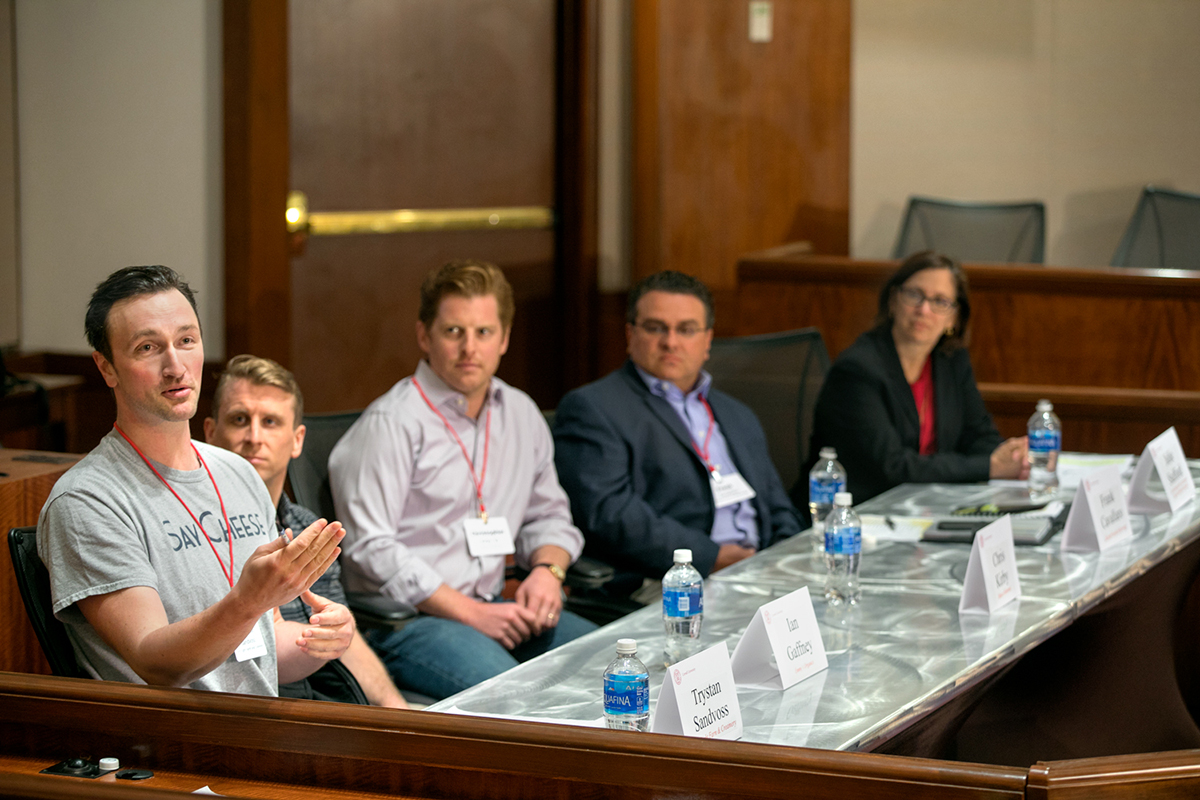Food entrepreneurs innovate, collaborate with Cornell
By Tobe Attah

For food entrepreneurs, the bitter battles between small and large companies are increasingly giving way to collaboration in the quest for better-tasting, high-quality food. Companies of all sizes are finding synergies in the face of consumer demand for locally grown, healthy food, and they are looking to food science researchers at Cornell for support. That’s according to leading food entrepreneurs who took part on the panel Advancing Food Entrepreneurship April 28 at the Statler Hotel, part of the Entrepreneurship at Cornell Celebration conference.
According to the panelists, food companies are competing to create innovative products as consumers increasingly choose products that are healthy, flavorful and contain ingredients that can be traced to a local source. Smaller companies are finding beneficial partnerships with established brands, as food entrepreneurs scale up to meet consumer demand.
“The food and beverage category can be a crowded and competitive place,” said Julie Stafford, industry liaison officer of the Cornell Institute for Food Systems Industry Partnership Program (CIFS-IPP), who moderated the panel. “We are seeing that it is no longer small companies versus large companies; instead, it is small and large companies working together, especially when the smaller companies realize success and must scale up to meet increasing demand.”
Christopher Kirby ’15, founder and president of Ithaca Hummus, experienced this consumer demand for healthy food options firsthand when he began expanding his hummus outreach. He handed out hummus samples in front of the Wegmans Food Market in Ithaca and used customer satisfaction with his product as a case study to present to Wegmans executives. Wegmans has been supportive of regional foods, and eventually he earned approval to sell his product in five of their stores. Since then his business has expanded, he said.
“It’s an exciting time to be in the food industry,” said Stafford. “As I see from our CIFS-IPP members, today’s food companies continue to be challenged to create higher quality, healthier, more sustainable options and often look to food science and technology for solutions.”
As part of CIFS-IPP, Stafford aims to help food companies large and small gain access to Cornell thinking and food solutions. Cornell has historically provided opportunities for experts in the food and beverage sector of agricultural technology, and this is a natural outgrowth of that mission, according to Stafford.
In the three years since the CIFS-IPP was formed, the program has grown to 24 members across the food system. Startups are using Cornell resources to better integrate into the food solutions market, she said.
“Cornell University is an excellent partner to young food companies. The business owners on this panel demonstrated the innovative thinking needed to be successful as a modern food entrepreneur,” Stafford said.
The technology at the newly opened High Pressure Processing Validation Center at Cornell’s New York State Agricultural Experiment Station in Geneva, New York, is being used by companies to ensure food safety. Stafford said it’s an example of Cornell expertise and facilities being used by private companies to test and create novel products.
“Entrepreneurs are a dedicated and passionate group, and it was exciting to be a part of the Advancing Food Entrepreneurship panel,” said Stafford. “Here at Cornell, there are many resources to support entrepreneurs, and it was impressive to see how much these young entrepreneurs have accomplished.”
Other panelists were Frank Cavallaro, vice president for business development, LiDestri Food and Beverage; Ian Gaffney, co-founder of Emmy’s Organics; and Trystan Sandvoss, co-founder of First Light Farms and Creamery.
Tobe Attah ’17 is a student writer for the College of Agriculture and Life Sciences.
Media Contact
Get Cornell news delivered right to your inbox.
Subscribe